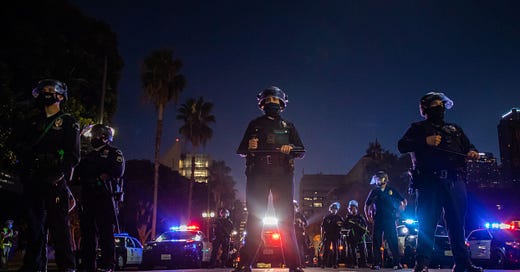There Is No Single Explanation for Police Brutality
A crime with many fathers. Plus: kids sports and rich people.
Programming notes: Tonight on the livestream Ted Johnson, Mona Charen, and I will be joined by Radley Balko to talk about the killing of Tyre Nichols and what can be done about our law enforcement problems.
I’ve been reading Radley for years, starting with his stuff for Reason and then when he moved to the Washington Post. I subscribe to his newsletter and if this subject is important to you, you should, too. For my money, he’s the single smartest guy on the subject of American law enforcement.
Don’t miss this conversation. Tonight at 8 pm in the East. Only for members of Bulwark+. Details here.
Also: I’ve got COVID (again) so newsletters are going to be short-ish for the rest of the week while I try to sleep it off. Sorry in advance.
1. The Problem with Police
I wrote about this a long time ago, at the beginning of the George Floyd protests: When it comes to talking about the failures of law enforcement, simplicity is the enemy.
We have a single problem: Law enforcement in America is in a sub-optimal place.
But this problem has many causes:
Racism
Lack of professional standards
Bad policy (qualified immunity)
Bad culture (“good” cops looking the other way on criminal actions of “bad” cops)
Corrupt institutions (police unions)
And that’s just the starter list. Some of these causes are related to one another. Some are stand-alone.
And the causes extend outward from law enforcement officers and up-and-down the criminal justice ladder. Prosecutorial over-charging is a problem. Prosecutorial reluctance to pursue charges against cops is a problem. Medical examiners shading the truth to make their working relationships with cops smoother is a problem.
It’s a big forking mess with no single answers and no easy answers, either. Like untangling a huge knot, the key is to zoom in on specific problems and try to address them, one at a time.
is very good at that. And a few weeks ago he zoomed in on one example of the judicial aspect of the problem. Here’s Balko:Shortly after Kyra Harris Bolden was sworn in as the newest justice — and the first-ever black woman — on the Michigan Supreme Court, one of her fellow justices [Michigan Supreme Court Justice Richard Bernstein] has publicly ridiculed her. . . .
[W]hat did Bolden do that was so offensive to Bernstein? She hired a man named Pete Martel to be one of her clerks. Martel is plenty qualified for the position. He has a law degree from Wayne State University, has been admitted to the Michigan Bar, and from what I can tell, is earning a Ph.D. in sociology from the University of Michigan. He has worked as a prisoner advocate, a mitigation specialist, and at the State Appellate Defender Office. It’s also not much of a surprise that Bolden would hire Martel. She campaigned with him when she ran for the state supreme court in 2022.
For most people, Martel’s life is also a remarkable and inspiring success story. In 1994, he was convicted of charges related to an armed robbery and attempted escape. He served 14 years in prison, was released in 2008, and then went about turning his life around. What irks Bernstein is that in the course of committing his robbery, Martel fired his gun at a police officer. . . .
Bernstein said Bolden’s hiring of Martel “disgusted” him. . . .
“I’m a Democrat, but I’m also intensely pro-law enforcement,” Bernstein reportedly declared, “and this is a slap in the face to every police officer in the state of Michigan.” . . .
The justices who serve on state supreme courts regularly hear cases for which law enforcement officers — both individually and collectively — are either parties or have a direct interest in the outcome. State appeals courts issue decisions on some of the most profound controversies we face in a free society — like the circumstances under which armed government employees can legally kill, beat, or detain people, and how and if they should be held accountable when they violate the constitution. These courts are tasked with striking the right balance between public safety and individual rights.
For a sitting justice to say he is “intensely pro-law enforcement,” then, ought to be every bit as outrageous as if he had said he is “intensely anti-law enforcement.” . . .
And let’s be clear, here. Bernstein did not say he is “pro-rule of law,” or “pro-enforcement of the law.” The context and his subsequent words makes him meaning and intent unambiguous. He was saying he is intensely pro police-officer.
And start thinking about questions you might have for Balko tonight. Leave them here.
2. Kid Sports
I reviewed Linda Flanagan’s book Take Back the Game here. The book is about how travel teams have ruined youth sports. This is a subject I am familiar with. I have thoughts:





